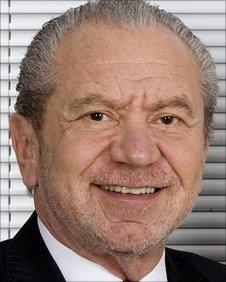Judge ordered Lord Sugar to remove expenses 'tweet'
- Published

Lord Sugar has more than 280,000 'followers' on Twitter
Lord Sugar was told to remove a Twitter message speculating on whether a peer on trial for expenses fraud would be cleared because he was a Conservative, it has emerged.
A Judge ordered the Labour peer and Apprentice star to take down the post in January during the trial of Lord Taylor, who was ultimately convicted.
Mr Justice Saunders ruled the message could unfairly influence jurors.
A spokesman for Lord Sugar said he had complied with the order immediately.
The media was prevented from reporting the matter at the time.
However, Mr Justice Saunders lifted the reporting restrictions on Thursday following the conviction of ex-Conservative peer Lord Hanningfield - the last in a series of expenses trials involving former parliamentarians.
The Labour peer has also tweeted on this verdict.
'20-minute matter'
Lord Sugar posted the message on the micro-blogging site on the second day of Lord Taylor's trial.
The businessman and TV star wrote: "Lord Taylor, Tory peer, in court over alleged expenses fiddle.
"Wonder if he will get off as he is a Tory compared to Labour MP who was sent to jail."
The MP he was referring to was former Labour MP David Chaytor who pleaded guilty to expenses fraud in December and became the first parliamentarian to be jailed for such offences.
When he learnt of the peer's message, Mr Justice Saunders cleared the court and said "can someone contact Lord Sugar and get that removed".
He also referred the matter to the Attorney General Dominic Grieve - who has the power to bring charges against individuals deemed to have harmed the judicial process. Mr Grieve decided to take no action on the matter.
A spokesman for Lord Sugar said he was not aware of the restrictions in the case as he was out of the country at the time and complied with the court order as soon as it was issued.
"It was a 20-minute matter and is now finished with," he said. "There is absolutely no way that Lord Sugar would want to prejudice any legal process at all."
'High profile trials'
Speaking on Thursday, Mr Justice Saunders said there was no suggestion Lord Sugar had intended to influence the trial or that its outcome had been prejudiced.
He added: "I reported the matter to the attorney general not for the purpose of taking any action against Lord Sugar but to investigate whether entries on Twitter sites of high profile figures relating to trials which were going to take place or were taking place posed a risk of prejudicing the fairness of a trial.
"And if so whether there were steps that could be taken to minimise that risk."
A spokesman for the Attorney General's office said: "The Attorney General considered the issue when it was made. He concluded there were no grounds for bringing proceedings under the Contempt of Court Act 1981."
Not long after news of the episode emerged, Lord Sugar used Twitter to comment on the outcome of the Hanningfield trial.
"Jury find TORY peer Lord Hanningfield guilty of six counts of false accounting," he wrote. "I wonder if he will get any jail time."
During Lord Taylor's trial, Mr Justice Saunders broke new ground by allowing journalists present in court to report details of proceedings via Twitter but urged them to use caution in how they did so.
Lord Sugar, who was ennobled by Gordon Brown in 2009, has had a number of spats on his Twitter pages, external with high-profile figures including Piers Morgan and Kirstie Allsopp.
At the end of Lord Hanningfield's trial, Mr Justice Saunders criticised party leaders for what he said were unjustifed attacks on expenses fraud suspects in early 2010 prior to their trials.
He said David Cameron, Nick Clegg and Gordon Brown had participated in a "pre-election frenzy" in which they had condemned MPs charged with offences for arguing they could only be tried by Parliament and seeking to obtain legal aid.
Parliamentarians were as entitled to apply for legal aid as any other defendant, he stated, and the criticism was "entirely without merit", adding it put "at risk" the fairness of subsequent criminal proceedings.
- Published25 May 2011
- Published25 January 2011
- Published26 May 2011